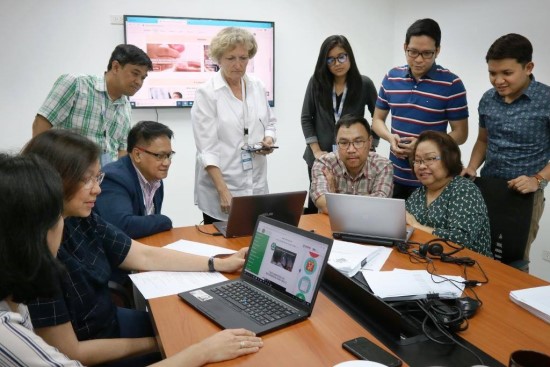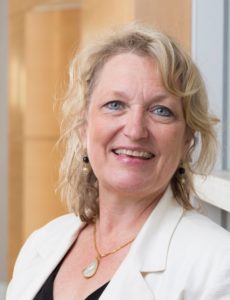
13 Nov Three Questions with Roxanne Zaghab: Innovating for Improved Health Worker Training
 Roxanne Ward Zaghab, MSW, DM, CKM, is a leader and innovator in online adult education for development and health practitioners and a prolific author on the topic of learner-centric engagement. Her passion is the human-technology interface including knowledge transfer in resource-constrained settings. At the American International Health Alliance (AIHA, a program partner in the HRH2030 consortium), she is the senior e-Learning advisor working with the Philippines Department of Health (DOH), USAID Philippines, and the USAID HRH2030 program on the DOH’s new e-Learning platform for health workers, DOH Academy. After its launch on October 25, we asked Dr. Zaghab to tell us a bit more about this work.
Roxanne Ward Zaghab, MSW, DM, CKM, is a leader and innovator in online adult education for development and health practitioners and a prolific author on the topic of learner-centric engagement. Her passion is the human-technology interface including knowledge transfer in resource-constrained settings. At the American International Health Alliance (AIHA, a program partner in the HRH2030 consortium), she is the senior e-Learning advisor working with the Philippines Department of Health (DOH), USAID Philippines, and the USAID HRH2030 program on the DOH’s new e-Learning platform for health workers, DOH Academy. After its launch on October 25, we asked Dr. Zaghab to tell us a bit more about this work.
Question 1: AIHA’s expertise in state-of the art training approaches was a great asset in the development of the Philippines new e-Learning platform for health workers, the DOH Academy. What was the situation on the ground when you first got involved?
During a field assessment, AIHA found notable challenges to delivering training to health workers. For one, insurmountable geographic barriers were compounded by expensive travel for professional development. Also, the Philippines’ approach to training used the practice of tallying learner attendance rather than focusing on the practice of behavior change.
The DOH, in partnership with USAID/Philippines and the USAID HRH2030 program, was seeking high-impact transformation of the sector to keep pace with the 2016 continuing professional development law and the move toward innovative competency-based health professional training.
While the Philippines was searching for solutions, the availability of educational technologies like open-source learning management systems multiplied. The evidence behind adult practitioner learning elucidated effective online educational strategies. AIHA had taken on similar challenges in Ethiopia and was able to offer the Philippines through the USAID HRH2030 program a vision and recommendations for a streamlined, innovative mobile-accessible learning system in online and offline settings.
Question 2: Tell us about the process to develop and roll out the e-Learning platform.
AIHA took on the task of optimizing an open source online learning platform, building on our experience with online practitioner continuing education. In 2018, extensive work was done to further develop the DOH portal—the DOH Academy— to provide access to the e-Learning system and also to establish the learning management platform that hosts the learning modules.
In January 2019, working in partnership with the DOH, USAID/Philippines, and others on the USAID HRH2030 program, we began in earnest to engage local vendors and establish prototype learning modules. By April, the DOH, with AIHA support, began testing the portal, platform, and modules, while building a prototype tablet for mobile and off-line learning. A group of DOH regional training specialists, regional human resource development unit personnel, and municipal health officers tested the tablet and recommended innovative adaptions for group and mobile delivery.
With the open source learning management system and portal in place, AIHA trained 26 local producers and experts (including members from three private e-learning companies, the DOH learning and development team, and the DOH knowledge management and information technology system) in new module development using the instructions and templates. Still others will be trained in January 2020. As a start, the focus was to produce family planning and tuberculosis training modules. Now, scale-up is underway with more than 40 instructional hours of health worker training in various stages of development.
The Department of Health’s next steps are to train implementing partners. AIHA through the USAID HRH2030 program will help while transitioning the portal, platform, and educational programs to the DOH. We are also charting a pathway for others to disseminate and manage tablets in the regions for rapid dissemination.
Question 3: What are your hopes for how e-Learning will transform the health system of the Philippines?
I believe our educational approach to e-Learning will drive the transformation in the Philippines. We made the platform interactive to keep it fun and engaging. Also, when developing the modules, a user-friendly technological interface was a must. The platform uses visual navigation and clear instructions for health workers—be they doctors, nurses, or midwives from the public or private sectors—who may be encountering their first online training. We understand that health worker motivation is key to adopting the platform and my first hope is that by ensuring the platform’s use, it will become an integral part of continuing professional development, resulting in positive ripple effects throughout the health system.
My second and greatest hope is that the actionable knowledge of each successful e-Learner will contribute to improved quality of care in every barangay [Filipino village]. With e-Learning, the transformation of the health system won’t happen overnight. But e-Learning is a key component of the nation’s efforts to strengthen universal health coverage. It provides health workers, regardless of location, with the latest research and tools to update their knowledge and enhance their services. It also reduces time away from health facilities, so health workers are where they’re needed most, providing clients with improved accessibility to care.
Learn more about our e-Learning initiative in the Philippines here.
Photo: HRH2030 consortium member AIHA’s Senior e-Learning Advisor Roxanne Ward Zaghab (center) leads a pilot test of the e-Learning platform. Credit: Alan Blue Motus, HRH2030.





